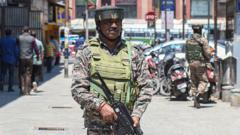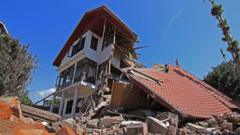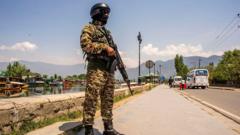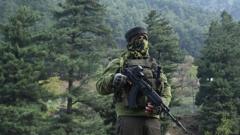In light of a recent deadly attack in Kashmir, the US Secretary of State has pushed both India and Pakistan to work towards de-escalating tensions. India has accused Pakistan of being involved in the attack, leading to a series of retaliatory measures. As both countries prepare for potential military responses, the situation remains precarious.
US Calls for Tension De-escalation between India and Pakistan Following Kashmir Attack

US Calls for Tension De-escalation between India and Pakistan Following Kashmir Attack
The US has urged both India and Pakistan to ease rising tensions after a militant attack in Kashmir left 26 civilians dead, amid fears of an escalating military conflict.
The United States has made a significant appeal for both India and Pakistan to collaborate in reducing tensions following a deadly militant attack in Indian-administered Kashmir that claimed the lives of 26 civilians last week. Secretary of State Marco Rubio conducted separate discussions with India’s Foreign Minister S Jaishankar and Pakistan's Prime Minister Shehbaz Sharif, urging the need for "peace and security in South Asia".
The Indian administration has accused Pakistan of backing the militants responsible for the attack on April 22 near the popular meadow location in Pahalgam, a claim Pakistan has vehemently denied. In retaliation, India announced the closure of its airspace to all Pakistani flights, marking another chapter in the ongoing cycle of hostility between the two nations.
Indian Foreign Minister Jaishankar emphasized on social media that the "perpetrators, backers and planners" of the Pahalgam attack must face justice, while Rubio expressed his condolences and reaffirmed America’s support in India's ongoing battle against terrorism. In addition, Rubio stressed the importance of condemning the terror attack during his dialogue with Sharif, who dismissed India's allegations linking Pakistan to the incident. The Pakistani Prime Minister furthermore called on the US to influence India to reduce aggressive rhetoric and act responsibly.
Compounding tensions, a warning was issued by Pakistan's information minister regarding "credible intelligence" that suggested India could undertake military action against Pakistan within a critical 24-36 hour window. In response, there has been speculation whether India might consider military options similar to its previous responses following militant attacks in 2016 and 2019. Islamic warnings from Islamabad included promises of retaliation should India initiate military strikes.
Amid the mounting strain, Indian Prime Minister Modi has engaged in a series of back-to-back meetings with senior state and military officials. Following these discussions, reports suggest that Modi authorized the Indian armed forces with complete discretion over their response to the Pahalgam attack, including timing and strategic targets.
Intermittent small-arms fire has been reported between troop forces along the borders, with India opposing numerous ceasefire violations attributed to Pakistan during weekly military communications. Recently, India imposed a ban on all Pakistani airlines in its airspace, a retaliation for a similar restriction by Pakistan. Additionally, India has suspended most issued visas to Pakistani nationals, marking the urgent escalation in diplomatic relations between the two countries.
The aftermath of these diplomatic engagements saw hundreds of Pakistani citizens leaving India, with reports indicating 786 departed through the Attari-Wagah border. In the wake of heightened tensions, numerous social media accounts and news channels from Pakistan have been restricted or banned in India, contributing to an increasingly strained environment for cross-border relations.
The volatile situation surrounding Kashmir continues to serve as a historically contested region, with ongoing violence and political discord rooted since the partition of India and Pakistan in 1947. India has attributed the Pahalgam incident to a militant group known as the Resistance Front, which it believes is linked to the Pakistan-based organization Lashkar-e-Taiba, identified as a terrorist entity by India.
Despite the official stance, Indian police reports have identified three of the four suspects linked to the attack, with two believed to be from Pakistan and one a local Kashmiri. Many attending survivors noted a specific targeting of Hindu men during the incident. The attack, which stands as the most lethal against civilians in Kashmir in two decades, has ignited strong sentiments of anger throughout India.
In a recent speech, Modi vowed that those responsible for the attack would face consequences that would "exceed their imagination," showcasing a commitment to retaliate and assert Indian sovereignty in the region.




















